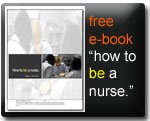Starting in January 2015, prospective Canadian nurses will be sitting a new Canadian RN entry examination, based on the American computerized NCLEX-RN® examination. The new examination will be developed by the American-based National Council of State Boards of Nursing (NCSBN®). This decision, by the Canadian Nurses Association, effectively means that at the end of 2014 the current Canadian entry exam, the Canadian Registered Nurse Examination (CRNE), will no longer exist.
Watch the 5 part video series for more information and insight:
Part 1: The Future of the Canadian RN Exam: The Situation.
Part 2: The Future of the Canadian RN Exam: The Impact to Canadians-Financial Losses to Canada.
Part 3: The Future of the Canadian RN Exam: What Does CNA Want?
Part 4: The Future of the Canadian RN Exam: How Do Governments Fit In?
Part 5: The Future of the Canadian RN Exam: Was a Canadian Solution Offered?
Monday, December 3, 2012
Friday, July 27, 2012
A World Without Nurses
Can you imagine a world without nurses?
Produced by Australia's Ausmed Education,
this video portrays a snapshot of why the world needs nurses.
"Nursing is possibly one of the most important professions in the world. Yet, nurses continue to be undervalued by so many. This inspirational video will throw a new light on this wonderful profession."
Wednesday, July 18, 2012
"The Image of You": Exploring Nursing Stereotypes
"The Image of You": Exploring Nursing Stereotypes
A fresh look at the stereotypical nurse for the 21st century, our enlightened age of social media and You Tube, discovers that the more things change the more they stay the same! Surprise - surprise! A research study called "The image of you: Constructing nursing identities in You Tube", published in the August 2012 issue of the Journal of Advanced Nursing, concluded that while there are some favourable portrayals in the media of the capable, clinically decisive, professional nurse, there are all too many derogatory representations.
"Nursing professional bodies were called on to act to protect the profession from unduly immoderate representations of the nurse and to support nurses in their efforts to maximize opportunities afforded by YouTube to promote a counter discourse."[Citation: Kelly, J., Fealy, G. M. and Watson, R. (2012), The image of you: constructing nursing identities in YouTube. Journal of Advanced Nursing, 68: 1804–1813. doi: 10.1111/j.1365-2648.2011.05872.x ]
Monday, June 4, 2012
Nurses' research utilization two years after graduation: A Swedish National Study
Nurses' research utilization (RU) as part of evidence-based practice is strongly emphasized in today's nursing education and clinical practice. The primary aim of RU is to provide high-quality nursing care to patients. A new Swedish national research study (published May 18, 2012) found that data on newly graduated nurses' RU was scarce, but a predominance of low use had been reported in other recent studies where about 50 % of the nurses one, two, and three years after graduation rated their use of research in clinical practice as low or very low. Also some factors associated with nurses' RU had previously been identified, including educational ones. With recent educational reforms, evidence-based nursing and RU are now strongly emphasized internationally in nursing education. A number of challenges remain, however, regarding the content of nursing education and the transition from education into working life (e.g., the integration of education and practice as well as the ability of students to access and interpret evidence). The purpose of this study was therefore to identify factors that predict the probability for low RU among registered nurses two years after graduation.
Citation: Forsman H, Rudman A, Gustavsson P, Ehrenberg A, Wallin L. (2012) Nurses' research utilization two years after graduation--a national survey of associated individual, organizational, and educational factors. Implementation Science 2012, 7:46 doi:10.1186/1748-5908-7-46.
Citation: Forsman H, Rudman A, Gustavsson P, Ehrenberg A, Wallin L. (2012) Nurses' research utilization two years after graduation--a national survey of associated individual, organizational, and educational factors. Implementation Science 2012, 7:46 doi:10.1186/1748-5908-7-46.
Thursday, May 10, 2012
Nursing Jobs in Ontario
A Canadian Press article today on CTV News Kitchener announced that Ontario will be hiring an additional 900 nurses this year, with the majority of those jobs being in nursing homes and community-based care settings. Click on the post title to read more.
Labels:
nursing career,
nursing jobs,
nursing shortage,
Ontario
Monday, March 26, 2012
New AACN Statistics Show an Increase in Nursing Enrollment
New AACN Statistics Show an Increase in Nursing Enrollment
The American Association of Colleges of Nursing (AACN) has released new data which shows an enrollment surge in Baccalaureate and Graduate Programs. In fact more than 75,000 qualified applications to professional nursing programs were turned away in 2011. Despite the fact that US nursing schools have been able to expand student capacity even in the face of faculty and resource shortfalls, "the latest data show that 75,587 qualified applications to professional nursing programs were turned away last year, including more than 14,354 applications to graduate programs." Click on the link for the full report on the AACN website.
The American Association of Colleges of Nursing (AACN) has released new data which shows an enrollment surge in Baccalaureate and Graduate Programs. In fact more than 75,000 qualified applications to professional nursing programs were turned away in 2011. Despite the fact that US nursing schools have been able to expand student capacity even in the face of faculty and resource shortfalls, "the latest data show that 75,587 qualified applications to professional nursing programs were turned away last year, including more than 14,354 applications to graduate programs." Click on the link for the full report on the AACN website.
Evidence-based Practice Among Swedish Novice Nurses
Evidence-based Practice Among Novice Nurses
"A modest start, but a steady rise in research use: a longitudinal study of nurses during the first five years in professional life." by Lars Wallin, Petter Gustavsson, Anna Ehrenberg and Ann Rudman
Implementation Science 2012, 7:19 doi:10.1186/1748-5908-7-19, Published: 19 March 2012.
Rationale for the study: "Newly graduated nurses are faced with a challenging work environment that may impede their ability to provide evidence-based practice. However, little is known about the trajectory of registered nurses' use of research during the first years of professional life. Thus, the aim of the current study was to prospectively examine the extent of nurses' use of research during the first five years after undergraduate education and specifically assess changes over time."
Conclusion: "There was a clear trend of increasing research use by nurses during their first five years of practice. The level of the initial ratings also indicated the level of research use in subsequent years. However, it took more than two years of professional development before this increase 'kicked in.' These findings support previous research claiming that newly graduated nurses go through a 'transition shock,' reducing their ability to use research findings in clinical work."
The title link takes you to the open source article published online in Implementation Science .
"A modest start, but a steady rise in research use: a longitudinal study of nurses during the first five years in professional life." by Lars Wallin, Petter Gustavsson, Anna Ehrenberg and Ann Rudman
Implementation Science 2012, 7:19 doi:10.1186/1748-5908-7-19, Published: 19 March 2012.
Rationale for the study: "Newly graduated nurses are faced with a challenging work environment that may impede their ability to provide evidence-based practice. However, little is known about the trajectory of registered nurses' use of research during the first years of professional life. Thus, the aim of the current study was to prospectively examine the extent of nurses' use of research during the first five years after undergraduate education and specifically assess changes over time."
Conclusion: "There was a clear trend of increasing research use by nurses during their first five years of practice. The level of the initial ratings also indicated the level of research use in subsequent years. However, it took more than two years of professional development before this increase 'kicked in.' These findings support previous research claiming that newly graduated nurses go through a 'transition shock,' reducing their ability to use research findings in clinical work."
The title link takes you to the open source article published online in Implementation Science .
Friday, March 23, 2012
RN's Supply & Demand
NEJM: Perspective
"Registered Nurse Labor Supply and the Recession — Are We in a Bubble?"
by Douglas O. Staiger, Ph.D., David I. Auerbach, Ph.D., and Peter I. Buerhaus, Ph.D., R.N.
March 21, 2012.
NEJM article provides an economic explanation of the "countercyclical nature of the health care industry", based on a workforce study model analysis of trends in RN labour force supply and demand.
"Registered Nurse Labor Supply and the Recession — Are We in a Bubble?"
by Douglas O. Staiger, Ph.D., David I. Auerbach, Ph.D., and Peter I. Buerhaus, Ph.D., R.N.
March 21, 2012.
NEJM article provides an economic explanation of the "countercyclical nature of the health care industry", based on a workforce study model analysis of trends in RN labour force supply and demand.
Monday, February 13, 2012
Ontario Hospital Association Produces Guide for IEN's
"Given the aging nursing workforce, effective management of IEN recruitment, retention and integration is a priority."The coverage on the site includes:
• Why you should hire IENs and what they bring to the workplace.
• How you can create a harmonious workforce that optimizes skills and knowledge.
• Case studies of organizational successes and leading practices.
• Links to useful resources and references, including interviews with healthcare organizations.
Thursday, January 12, 2012
The NHS Future Forum Report
In the on-going effort to improve the quality of patient care in the UK, the latest instalment of the "NHS ~ Future Forum Report", released January 10,2012, calls on health care professionals to lead the way in patient-centered care. With regard to nursing and midwifery education the report states concern over inconsistencies in the training of nurses. The report touches on the academic nursing degree requirement, the reliance on 'virtual' training experiences due to lack of community placements, and the decline in numbers seeking post-graduate training in nursing specialist areas. Click here to read the full report.
Subscribe to:
Posts (Atom)












